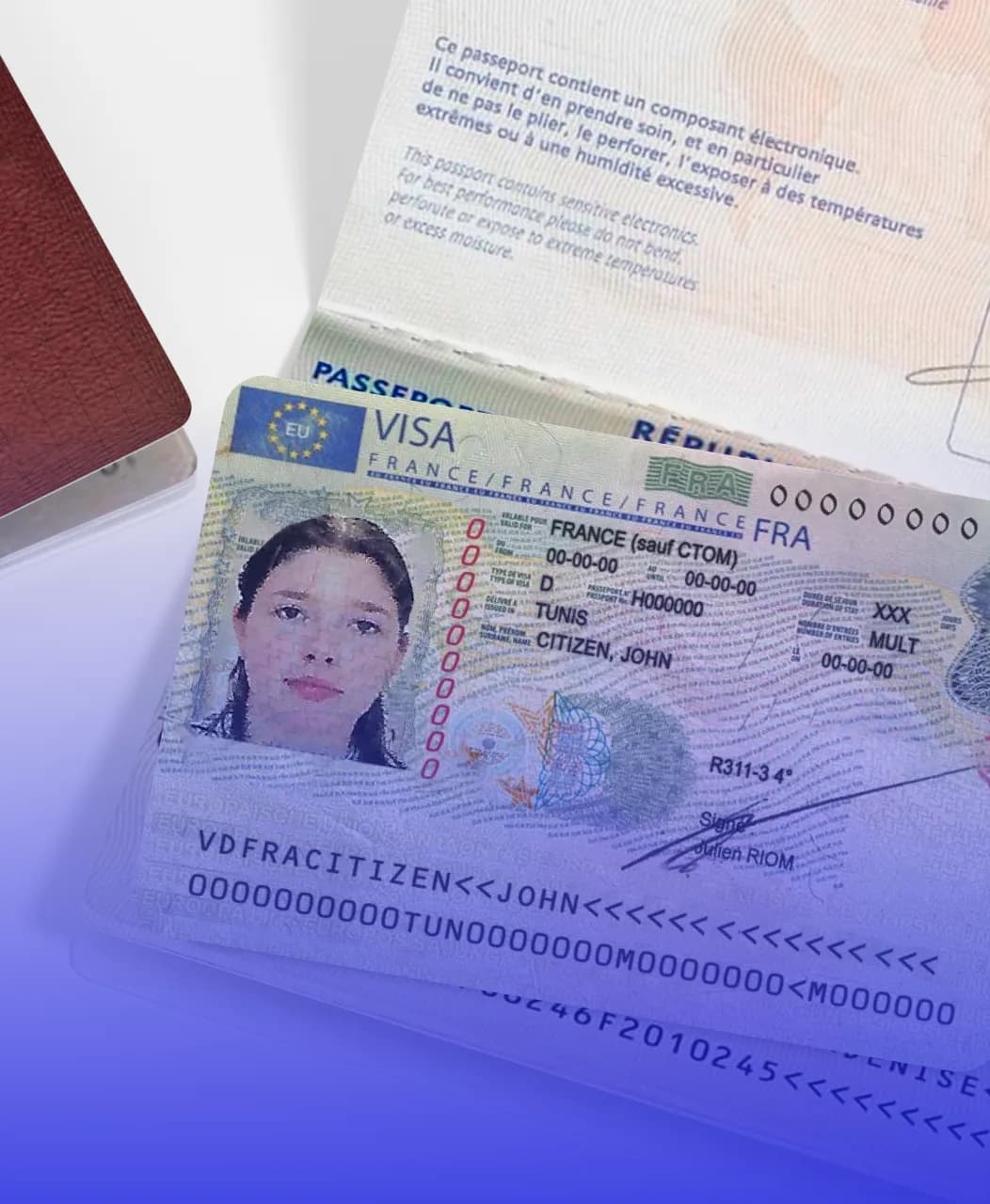Empadronamiento: Why and How to Register at the Town Hall in Spain
The complete guide to understanding empadronamiento in Spain. Discover the steps to register at the padrón municipal and obtain your residence certificate.

International Mobility Expert
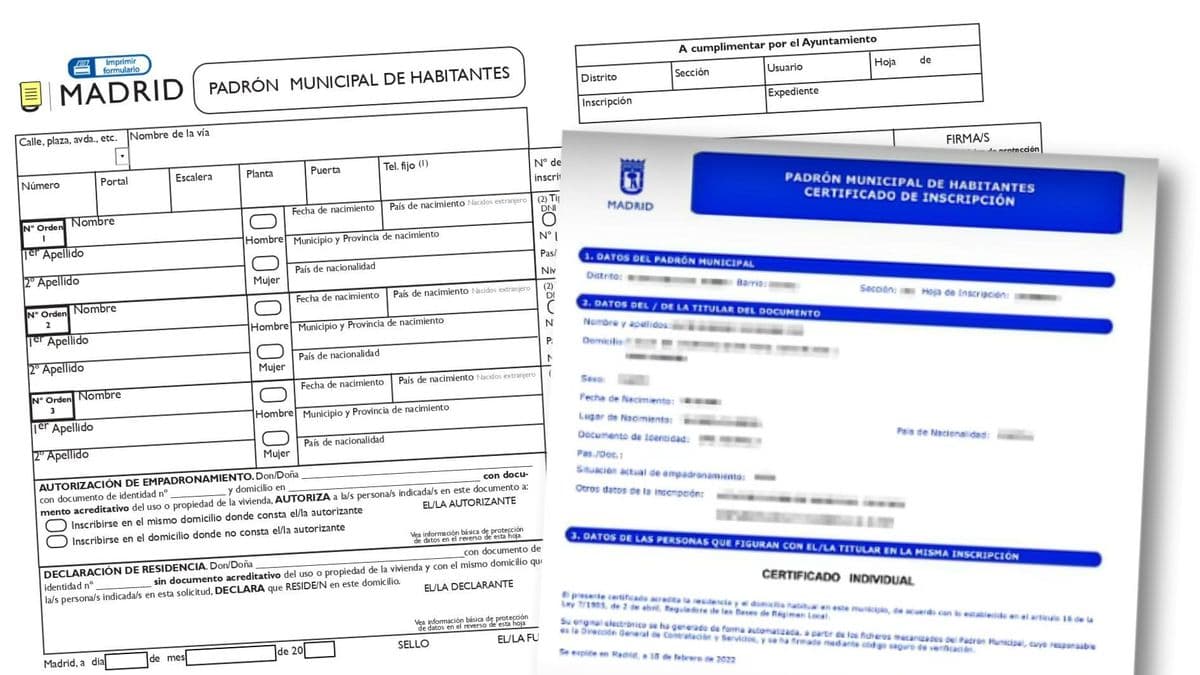
This article is a complete guide to empadronamiento, the procedure for registering on the padrón municipal – the municipal register of inhabitants, called "padrón" in Spanish – at the local town hall (Ayuntamiento). Whether you are settling in Madrid, Barcelona, Valencia, Seville, or elsewhere in Spain, this is an essential administrative step for anyone residing in the country on a regular basis. In other words, it is about registering as an inhabitant of the city where you live, much like a local administrative domiciliation. This official registration certifies your residence and grants you the status of a municipal resident, which allows access to essential services such as social security, education, as well as other municipal public services (healthcare, schooling for children, etc.).
What is empadronamiento?
Empadronamiento is the registration of your address and personal information in your municipality's register of inhabitants. Spanish law defines the padrón municipal as the "administrative register where the inhabitants of a municipality are listed." To get empadronado therefore means to declare your residence at the town hall, which is the administration responsible for managing the municipal register of the city or village where you usually live. It is essential to indicate precisely where you live during registration, as this determines the competent town hall and the validity of your administrative procedures. Anyone who lives in Spain on a stable basis, whether a Spanish citizen or a foreign resident, has a legal obligation to register on this list. Registration can be done in different places or municipalities depending on your main residence.
In practice, empadronamiento plays a role similar to a local census or administrative domiciliation. It formalizes your address in Spain and serves as proof of residence. This registration is a right and a duty for the resident: it makes you a legally recognized inhabitant of the municipality where your effective home is located. Being empadronado (registered on the padrón) is essential to benefit from certain local rights and services, for example, accessing the public health system or enrolling your children in school in the city where you reside.
Who can apply for empadronamiento?
Anyone residing in Spain, regardless of their nationality or administrative situation, can and must apply for registration on the municipal padrón. Whether you are a Spanish citizen, a European Union national, or a foreigner from a third country, empadronamiento concerns all inhabitants who usually live in a Spanish municipality. It is not necessary to have a residence permit or a work permit to register: the municipal padrón is open to anyone who can prove that they actually reside at a given address, even temporarily.
This procedure applies to adults as well as children, students, retirees, families, or even people staying with relatives. Registration on the municipal register is therefore a fundamental right, but also a legal obligation for all residents, regardless of their immigration status. This allows the town hall to keep the population census up to date and to ensure access to public services for all inhabitants of the municipality. If you have just arrived in Spain, do not wait until you have finalized all your immigration procedures: empadronamiento is often the first step to take, even before obtaining your NIE or your residence permit.
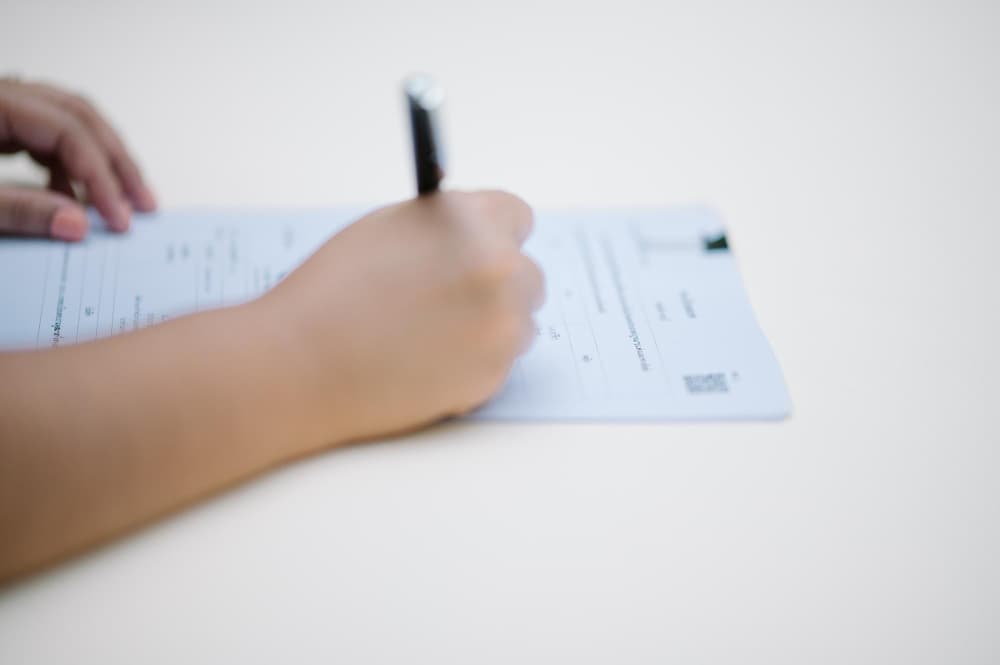
Why get empadronado?
Registering on the municipal padrón has many administrative advantages and is generally a mandatory step if you reside in Spain. On the one hand, it is a legal obligation provided for by Spanish legislation: anyone residing in Spanish territory must be registered in their municipality of residence, otherwise they are in an incorrect administrative situation. Registration on the municipal padrón is therefore essential to officially justify your residence with the local authorities. On the other hand, this registration provides you with a certificado de empadronamiento (empadronamiento certificate) which will be required for many procedures. This official document, which certifies your address, serves as proof of residence in multiple situations.
For example, the certificado de empadronamiento will be required to:
- Apply for your NIE or resident card in Spain (residence permit).
- Register with the Spanish social security system to obtain public health coverage (asistencia sanitaria).
- Register a vehicle in your name in Spain (proof of local residence required).
- Enroll your children in school or public daycare in your neighborhood.
- Get married in Spain (civil marriage file) or apply for certain social benefits and public aid.
As you can see, most common administrative procedures in Spain require this proof of address. Indeed, many immigration procedures (visa application, residence permit, family reunification, etc.) or even civil ones cannot be completed without proving your residence in the concerned municipality. Therefore, empadronamiento is often one of the very first steps to take once you have settled in, as it will facilitate all subsequent ones. Finally, being empadronado also benefits the community: it allows the town hall to count its residents and to allocate local resources according to the real population (schools, health centers, transport, budgets, etc.).
Besoin d'aide pour votre Empadronamiento en Espagne ?
Notre équipe vous accompagne pour votre inscription municipale (Padrón) et faciliter toutes vos démarches en Espagne.
Plus de 600 inscriptions réalisées
Where and when to do the procedure?
Empadronamiento is done at the town hall (Ayuntamiento) of your place of residence. It is important to know the specific addresses of the town halls or municipal offices where to register; these addresses are generally available on the official websites of the municipalities. As soon as you have a stable home – whether it is a rented apartment, a home you have bought, or even if you are staying with family or friends – you should start this process without delay. It is not necessary to be a homeowner: anyone who usually lives in a home in Spain can and must get empadronado, even at a temporary or shared address. The ideal is to register as soon as you move in, without waiting, to be in good standing and to be able to unlock access to local services.
In case of a change of address, you will need to update your empadronamiento. Concretely, this means re-registering at the new address: either by declaring the change of address within the same municipality, or by carrying out a padrón transfer to the town hall of the new municipality if you move to another city. The procedure for changing your address is similar to a first registration (you will need to fill out a change of address form and provide the same supporting documents). Note that if you move to another municipality, registering in the new city will automatically result in your removal from the padrón of your former place of residence – so you do not need to formally "unregister" from the first town hall in this case. However, if you leave Spain permanently, it is recommended to inform the town hall to be removed from the padrón (deregistration) to report your departure abroad.

Register as soon as you arrive
As soon as you arrive in Spain, it is highly recommended to register on the municipal padrón without delay. This step is essential to start all your other administrative procedures, especially if you need to apply for a residence permit, a work permit, or any other official document related to your settlement. The empadronamiento certificate, issued after this registration, is the official proof that you reside in the concerned province or municipality – an indispensable document for most immigration and integration procedures. Registration on the padrón is generally quick and free, provided you present all the required documents at your appointment at the town hall. By anticipating this step, you will avoid delays in your other procedures, such as opening a bank account, accessing social security, or enrolling your children in school. So, remember to prepare your file as soon as you settle in: this will greatly facilitate your stay and integration in Spain.
Besoin d'aide pour votre Empadronamiento en Espagne ?
Notre équipe vous accompagne pour votre inscription municipale (Padrón) et faciliter toutes vos démarches en Espagne.
Plus de 600 inscriptions réalisées
Documents required for registration
To register on the padrón, you will need to provide several supporting documents. It is advisable to prepare all the necessary documents in advance to avoid unnecessary trips back and forth. In general, the documents required for empadronamiento are:
- Registration form (hoja de empadronamiento) duly completed and signed. This form is usually available at the town hall counter or downloadable from your Ayuntamiento's website.
- Official identity document: this can be an identity card, a passport, or a national identity card. For EU nationals, the identity card or passport are accepted as valid identification. If you already have a NIE card, it must also be presented. These documents serve as official proof to verify your identity at the appointment at the town hall or at the Oficina d’Atenció Ciutadana.
- Proof of address: for example, a rental contract (contrato de alquiler) in your name, accompanied by a copy, or a property deed if you are the owner. Alternatively, a recent utility bill (electricity, water, internet…) in your name may sometimes be accepted as proof of residence.
- Authorization from the landlord: if you are not the leaseholder (for example, if you are staying with someone or renting a room), you must provide a written authorization signed by the owner or main tenant who is hosting you, authorizing you to register at this address, as well as a copy of their identity document. Ideally, this person should accompany you to the town hall to confirm that they are hosting you.
Remember to bring the originals and photocopies of each document, as the municipal officer will need to check the originals and will sometimes keep copies for the file. The exact list of documents may vary slightly depending on the municipality, but the elements listed above are required everywhere in Spain. The empadronamiento form collects your basic personal information: name, first name, sex, date and place of birth, nationality, full home address, ID document number (NIE/Passport), and possibly your highest level of education. This data will feed into the municipal register as well as the INE (National Statistics Institute) for population statistics and future electoral registration.
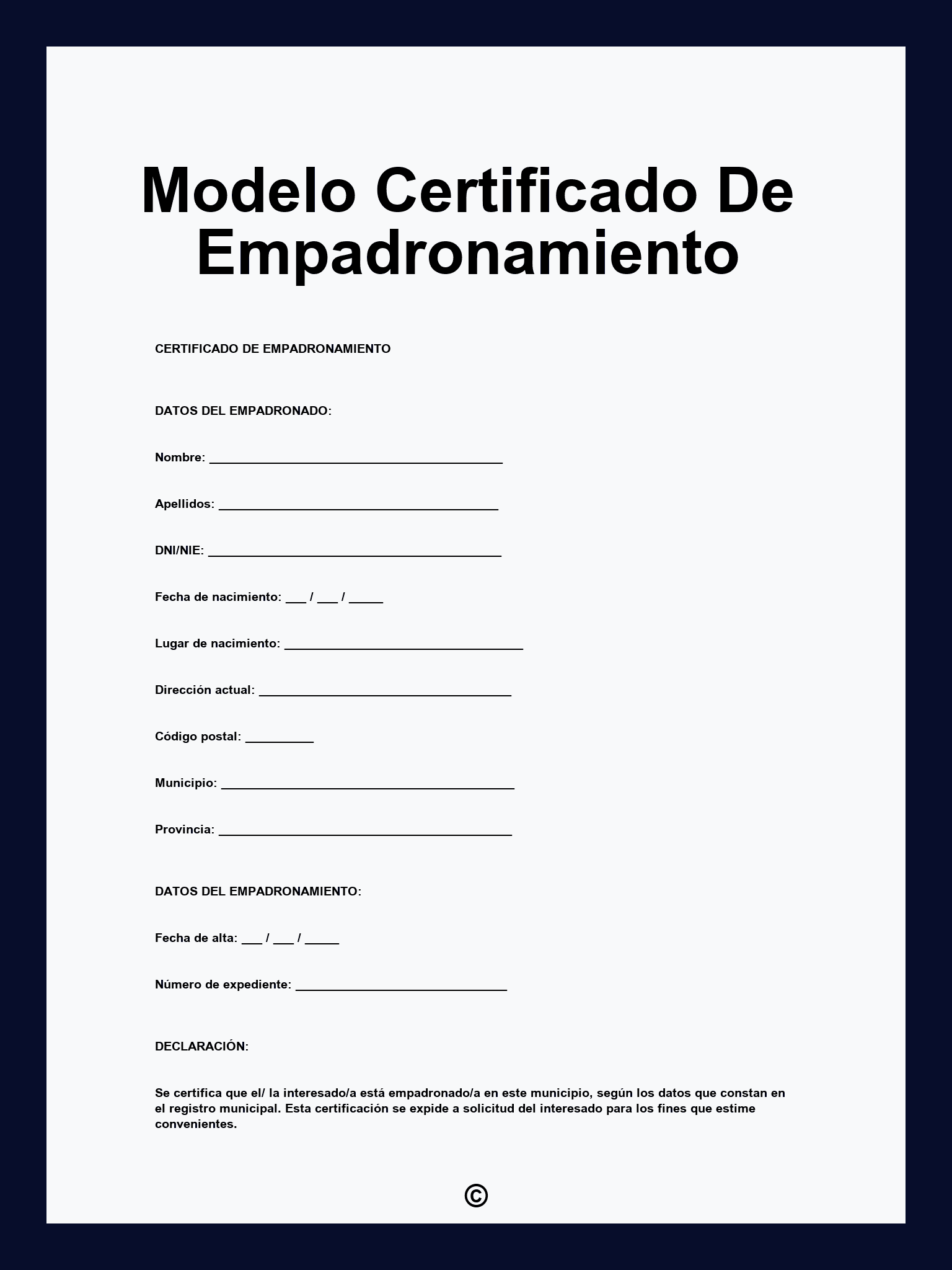
At the town hall counter
The standard procedure to get empadronado is done in person at the counter of the Padrón service at the town hall. In large cities, it is often necessary to make an appointment (cita previa) online or by phone before going. On the day, go to the town hall (or the designated municipal office) with all the required documents. A municipal employee will check your documents and will fill out or validate your registration in the municipality's computer system with you.
If your file is complete, the registration is usually done immediately. The town hall can then issue you a document certifying your registration. In many municipalities, you will be given a “volante de empadronamiento” on the spot – a printed proof of registration on the padrón, which contains your contact details and serves as proof of residence (this registration statement is sufficient for most common procedures). For official uses requiring a certified document, you can request a certificado de empadronamiento signed and stamped by the town hall. Often, the certificate and the volante are distinguished, the certificate being the official document with a signature, and the volante a simple informational document.
Online Empadronamiento
Traditionally, the first registration on the padrón is done at the counter, but there are increasingly more options to get empadronado remotely in large cities. Some municipalities have implemented online or mail-in procedures, especially in metropolitan areas. Barcelona or Madrid, for example, offer the possibility to request empadronamiento online or by phone, without having to go in person immediately. Your town hall's website will usually have a Trámites (procedures) or Padrón Municipal section where you can start the online application. You will be asked to fill out a digital form with your personal data and address, and to attach scanned copies of the required documents.
However, the online procedure may have limitations. Often, for a first registration, the town hall will still require a physical verification from you: for example, in Barcelona, after an online pre-application, the town hall sends a form by mail that you must sign and return within a given period, possibly accompanied by certified copies of the supporting documents. Similarly, for an online application, it is common to need a digital certificate or electronic identifier (Cl@ve system, electronic DNI, etc.) to sign the application digitally. Without an electronic identifier, you will likely be directed to a postal mail procedure.
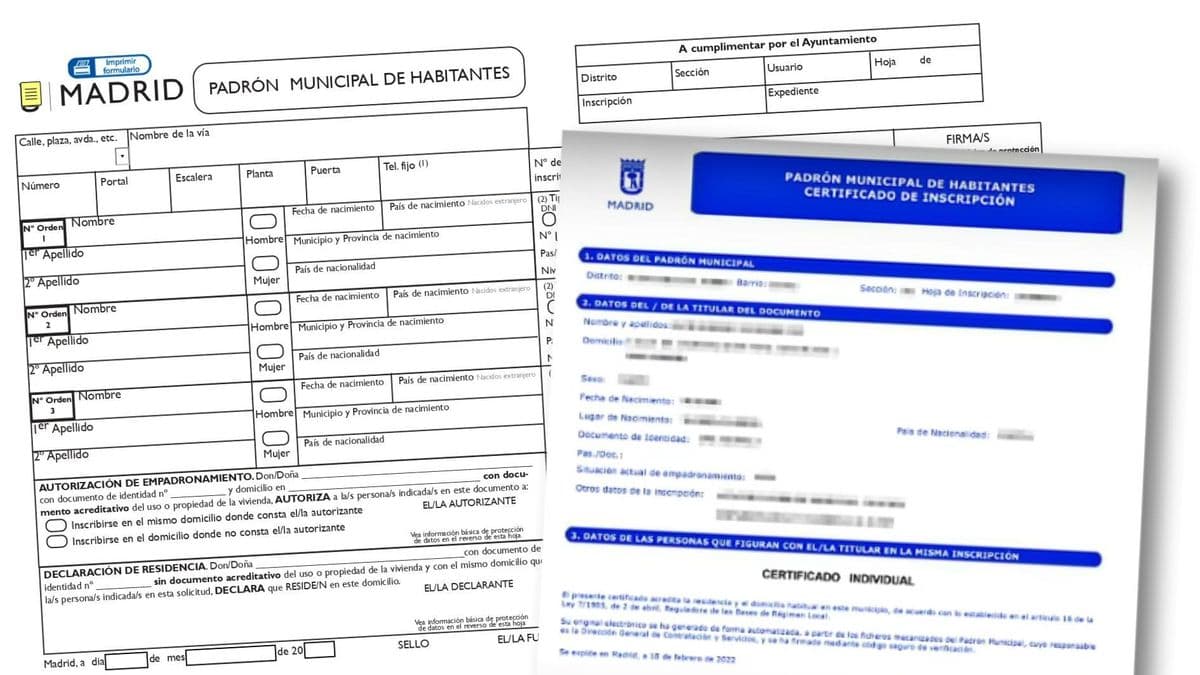
Besoin d'aide pour votre Empadronamiento en Espagne ?
Notre équipe vous accompagne pour votre inscription municipale (Padrón) et faciliter toutes vos démarches en Espagne.
Plus de 600 inscriptions réalisées
To conclude
Empadronamiento is a fundamental and mandatory step in your new life in Spain. Far from being a mere formality, it is the key that will open the doors to many essential services and rights. By following this guide, you should be able to complete this procedure smoothly.
Once you have your certificate in hand, you can focus on the more exciting aspects of your expatriation, such as discovering your new neighborhood. If you are still looking for the ideal place to settle down, do not hesitate to consult our guide on the best neighborhoods to live in Madrid.

